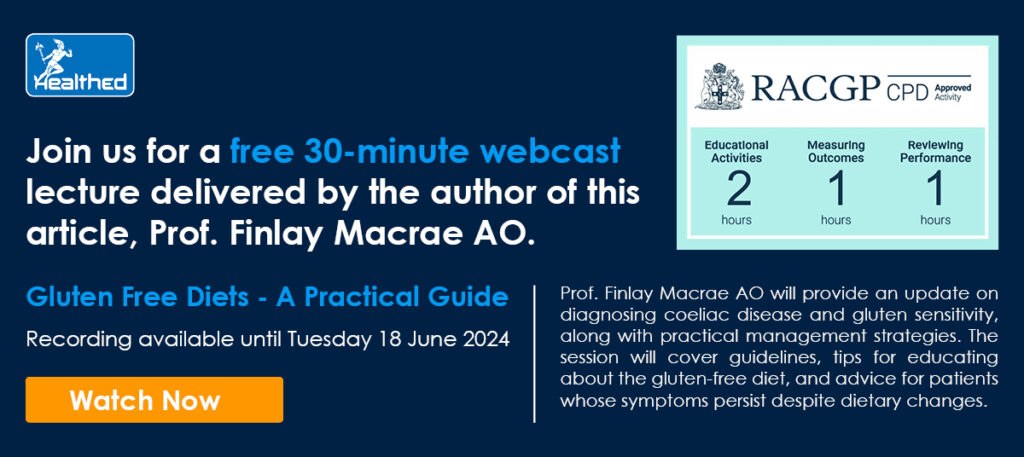Despite the increasing awareness and prevalence of gluten sensitivities and coeliac disease, significant gaps in understanding persist within the medical community.
Wheat- and gluten-related disorders are highly prevalent in Australia, with the most serious condition, coeliac disease, affecting approximately 1.5% of Australians. However, this number is small when compared with recent estimate of 24.2% of the population avoiding dietary wheat or gluten due to reasons other than coeliac disease (20.5% partial avoidance, 3.8% complete avoidance). The same study found that the most common form of gluten-related disorder was self-reported non-coeliac wheat sensitivity (NCWS), accounting for 13.9% of surveyed respondents.
With coeliac disease, chronic gluten exposure is associated with enteropathy, elevated anti-tissue transglutaminase 2 antibodies, adverse symptoms and an increased risk of complications such as osteoporosis and lymphoproliferative malignancy.
For those with coeliac disease, and for many with NCWS, treatment is seemingly simple but practically very challenging. It requires complete elimination of gluten and avoidance of gluten cross-contamination in their diet. This is inherently difficult and presents patients with significant challenges not only with their diet, but with restricting their lifestyle (eating out, travel, etc). It can lead to social isolation and anxiety, ultimately affecting their quality of life.
Strict gluten avoidance is the primary therapeutic strategy for gluten-related disorders and the only currently recognised treatment for coeliac disease. The intricacies of diagnosis, management, and patient education around the gluten-free diet underscore the multifaceted challenges in caring for patients. This emphasises the need for training to bridge knowledge gaps and provide a holistic approach to treating these conditions.
Knowledge gaps in gluten-related disorders
A recent survey conducted by HealthEd on Australian GPs identified diverse questions, concerns, and educational needs among health care professionals dealing with gluten-related disorders. From 139 respondents, the most common knowledge gaps identified included:
- Diagnostic challenges: addressing difficulties in diagnosing gluten sensitivity and coeliac disease including distinguishing between the two, assessing test reliability (eg, serology, biopsies) and exploring alternative diagnostic methods in cases of inconclusive results.
- Management and treatment: covering strategies for managing gluten sensitivity and coeliac disease including dietary guidance, medication use, potential complications (eg, effects on liver function tests, bone mineral density) and updates on treatment options.
- Patient education and awareness: focusing on educating patients about gluten sensitivity and coeliac disease, debunking common misconceptions (eg, self-diagnosis, dietary trends), stressing the importance of accurate diagnosis, treatment adherence and offering resources for adapting to gluten-free lifestyles.
- Genetic and epidemiological factors: investigating the genetic basis of coeliac disease and gluten sensitivity, exploring their prevalence in various populations, and examining potential associations with other autoimmune conditions or infections.

Understanding the significance of inadvertent gluten ingestion
For those with coeliac disease, the most common cause of persistent symptoms and enteropathy is ongoing gluten exposure with studies showing that gluten cross-contamination of meals is a frequent source of unintentional gluten ingestion. Symptoms may vary considerably, but as little as a few crumbs of food containing gluten may, in some patients with coeliac disease, result in severe gastrointestinal manifestations such as stomach bloating, cramps, and diarrhoea, and in time, extra-intestinal symptoms such as gluten ataxia, neuropathy, encephalopathy, fatigue, depression and anxiety, often occurring despite patients reporting adherence to a strict gluten-free diet.
A 2024 study conducted by researchers from the Walter and Eliza Hall Institute of Medical Research and The Royal Melbourne Hospital, highlighted how common accidental gluten ingestion is. The study investigated the presence of gluten immunogenic peptides (GIPs) in urine and stool samples from adults with treated coeliac disease. These results showed that at baseline, 77% of participants displayed at least one stool sample positive for GIPs, indicative of ongoing gluten exposure, despite all indicating they were on a gluten-free diet. Clearly, unintended gluten consumption is common in patients with coeliac disease.
Eating meals and preparing food are social activities. Most social occasions, events and travel (leisure or otherwise) involve food. Often these meals are prepared by others and are considered a common source of inadvertent gluten ingestion. The restrictive nature of the gluten-free diet and fear of inadvertent gluten exposure and its consequences may lead to social isolation and anxiety, which may ultimately negatively affect the patient’s quality of life.
Where we can do better
Practitioners have long prescribed the gluten-free diet, often without fully understanding its limitations and the profound effect on patients’ lifestyles and quality of life. Until alternative treatments emerge, it is crucial to prioritise strategies, patient education and tools to address the challenges in the gluten-free diet.
Given that unintentional gluten consumption results in ongoing symptoms and gut damage, and the difficulties in maintaining a gluten-free diet without severely restricting lifestyle, an important aspect of the gluten-free diet would be to tackle the challenge of inadvertent gluten ingestion.
To address this, an Australian product, GluteGuard (Glutagen Pty Ltd) harnessed an enzyme from the Carica papaya fruit (papaya or pawpaw), caricain, which has high efficacy in hydrolysing toxic and immunogenic peptides in gluten. Clinical trials demonstrated a GluteGuard tablet (taken before a meal) protected coeliac patients from the effects of a daily gluten challenge, resembling accidental consumption of gluten, for the length of the trial — up to 42 consecutive days.
Enzyme therapy with caricain offers significant protection for patients dining outside the home or in situations where gluten contamination may occur. GluteGuard is not a cure or treatment for gluten-related disorders or coeliac disease, but it provides an additional tool to the gluten-free diet, helping protect sufferers from the symptoms of inadvertent gluten consumption and providing a source of comfort during engagement in social activities and travel, thus improving quality of life.
To conclude, GPs should seek to continue their education on the management of gluten-related disorders. They should consider referring non-responsive patients to specialised dietitians for comprehensive support, including education, diet assessment, and counselling for navigating social situations. Additionally, consulting specialist psychogastroenterologists may prove beneficial.
Prof. Finlay Macrae AO is the head of colorectal medicine and genetics at the Royal Melbourne Hospital.

 more_vert
more_vert
I was diagnosed Coeliac in August 2023, at the age of 67. I find the general lack of knowledge community wide is frustrating. Coeliac Australia have been a wonderful help with educative information. Quite frankly I’d be lost without them. The food industry is definitely lacking in the most basic knowledge of Coeliac requirements and also food allergies. I firmly believe that all food safety training qualifications should include thorough training in just how vital it is that Coeliac Disease is a serious medical that requires correct planning, preparation and service of foods. I am so sick of trying to explain to u educated food service employees that it really does matter for them to know how to do their job properly in respect of people with all types of dietary requirements, and that Coeliac Disease is a serious medical condition, not a dietary fad.